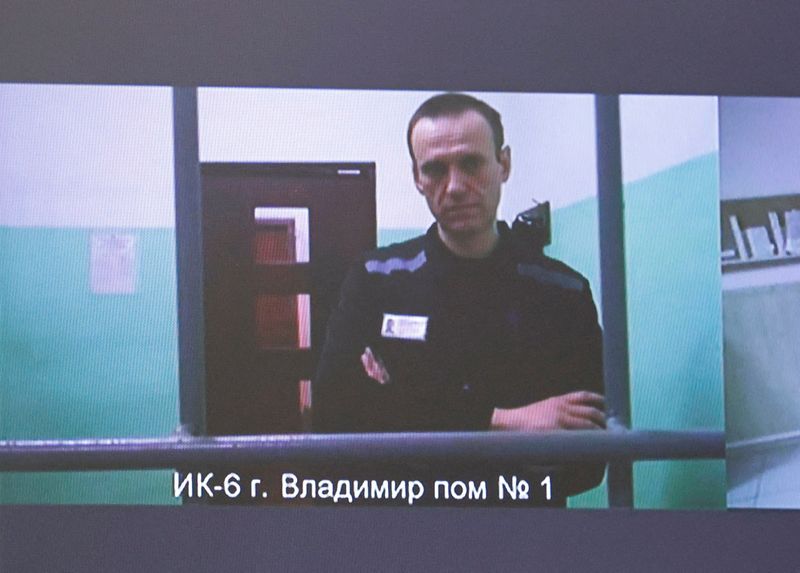MOSCOW (Reuters) -The Kremlin dismissed concerns on Tuesday about the location of opposition politician Alexei Navalny inside the Russian prison system and told the United States to mind its own business.
Navalny's allies said on Monday that he had been removed from the penal colony where he had been imprisoned since the middle of last year - the IK-6 facility in Melekhovo, 235 km (145 miles) east of Moscow - and that his current whereabouts were unknown.
Supporters had been preparing for his expected transfer to a "special regime" colony, the harshest grade in Russia's prison system, after he was sentenced in August to an additional 19 years in prison on top of 11-1/2 years he was already serving.
Navalny, who aspires to replace Vladimir Putin as president, says all the charges against him were trumped up by the authorities to keep him out of politics, something the Kremlin denies.
The process of moving prisoners by rail across the world's largest country can take weeks, with lawyers and family unable to obtain information about their location and well-being until they reach their destination.
It was unclear if Navalny was already in transit to a new prison.
U.S. State Department spokesperson Matthew Miller said on Monday that Washington was deeply concerned about Navalny's wellbeing and had reminded the Russian authorities that they were responsible for what happened to him.
The Kremlin, which said it did not track the movements of individual prisoners, on Wednesday told Miller and his colleagues to mind their own business.
"Here we are talking about a prisoner who has been found guilty under the law and is serving his sentence. And here we consider any interference by anyone, including the US, as unacceptable and impossible," Peskov told reporters.
Kira Yarmysh, Navalny's spokesperson, said on Monday that staff at the IK-6 facility in Melekhovo had told Navalny's lawyer waiting outside that he was no longer among its inmates.
On Tuesday, Yarmysh wrote on X, formerly known as Twitter:
"Today Alexei was again not brought to court to appear by video link, but now nobody is talking nonsense about an 'electricity accident'. An employee of penal colony-6 stated that Alexei had left their colony, but that he allegedly did not know where he had been transferred to," she wrote.
Yarmysh suggested that an initial explanation given for six days that an electricity problem had been responsible for Navalny's non-appearance had been a ruse by the authorities to play for time.

There was no immediate comment from Russia's prison service.
Navalny's disappearance comes at the start of the campaign period for a March presidential election when Vladimir Putin is expected to win another six-year term in office.